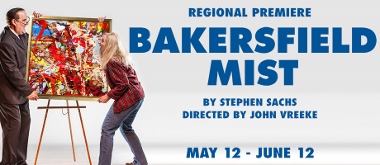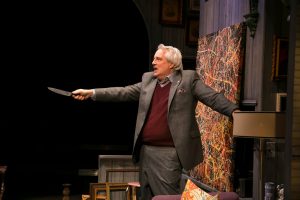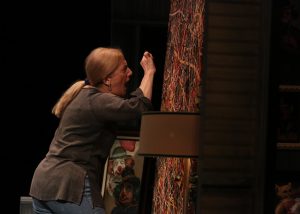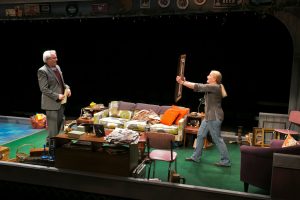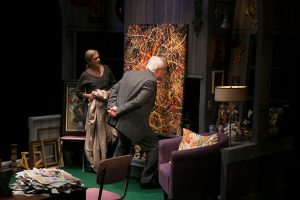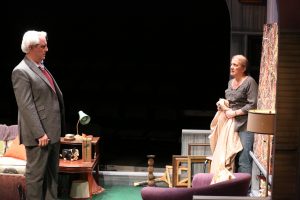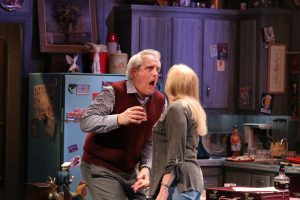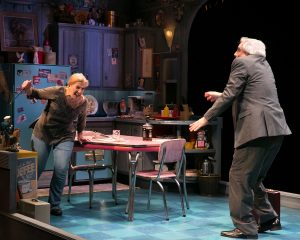THE FOGGIEST
In a 2007 issue of Washington Post Magazine, Gene Weingarten recounts Joshua Bell’s 45 minutes busking in a D.C. Metro station. One of the world’s most famous violinists played Bach anonymously at rush hour, ignored by most commuters but appreciated by a few who stopped to enjoy unexpected beauty. Stephen Sachs tosses this anecdote into his 2012 play Bakersfield Mist as evidence that the world is a pit where beauty is ignored and devalued. But Sachs’s version omits those who elected to notice Bell, the social strata attracted to excellence. Facile, untrue, his interpretation fits the play.
In Olney Theatre Center’s new production of the Sachs comedy, skilled designers and an experienced director (Woolly Mammoth’s John Vreeke) tell the story of an hour that makes absolutely no difference to the people living it. The production team – with the exception of strong sound design by Christopher Baine and a good brawl by Casey Kaleba – seems inspired by the writing to a perfunctory, unsurprising Here-it-is. A passionate investment on the part of anyone in the theater during these 75 minutes seemed inconceivable on Sunday.
Without insight or humor, Bakersfield Mist details the efforts of a Kern County redneck to persuade a former director of the Metropolitan Museum of Art that her junk-shop purchase is a lost mid-century masterpiece. The woman is cynical and crude, her life empty of ambition or meaning. The art professor is cynical and effete, a featureless has-been. The rehabilitation of these characters is worthless to consider. The hundred million dollars dangled by the script highlights the impossibility of a factor large enough to make these people interesting.
As written, and as acted at the Olney, neither character behaves as if motivated to achieve a result. The two strangers are ugly and confrontational from lights-up, convincing each other of nothing, making no revelation of dramatic relevance. What they want, when it’s clear, makes no sense in a story that defies analysis: The only concrete clue to the painting’s authenticity is abandoned by both characters immediately after its ten-minute introduction, two-thirds of the way through the show. One character makes only empty gestures and the other only repeats himself, and we are informed at the end that identical interviews have already happened, with the same result. Why this, then?
One could argue that Beckett too wrote sentimental plays about idiots who learn nothing. But one does not learn nothing from watching them. You know within two seconds that this play will provide no catharsis. As its antagonist says, it doesn’t take long to identify a thing as the genuine article or a knockoff.
Questions of authenticity, of value, of integrity are used here as literal figuratives, providing banter sans wit, sans philosophy. What makes an expert? Who defines taste? How can we carry on? This show is unwilling to imagine answers, or even follow-up questions. What is answered shouldn’t be: Will the Fifth Avenue snob get taken down a peg by the trailer-park bartender? Will monologues of loss and regret be traded over a bottle of Jack Daniel’s (“I really shouldn’t”)? Will sloppy pop-culture references feed a trash fire of slapstick homilies?
Plays like this one, which has already crossed the Atlantic, are the single moral argument against the Actors’ Equity small-theater code under which they were developed in Los Angeles. Most of the entertainment Hollywood exports can be excused by commerce, but that argument won’t hold for a two-character issue play. It is more germane to note that the market for straight plays is subsidized as a nonprofit exercise, as this play originally was, as most are. But the dwindling worldwide audience for staged drama is so specialized as to make Bakersfield Mist productions in England, Scotland, Sweden and Czechoslovakia even harder to comprehend. Who needs a play a child could follow about static suicidal assholes?
photos by Nick Griner
Bakersfield Mist
Olney Theatre Center
2001 Olney-Sandy Spring Road in Olney, Maryland
scheduled to end on June 12, 2016
for tickets, call 301.924.3400 or visit Olney Theatre
